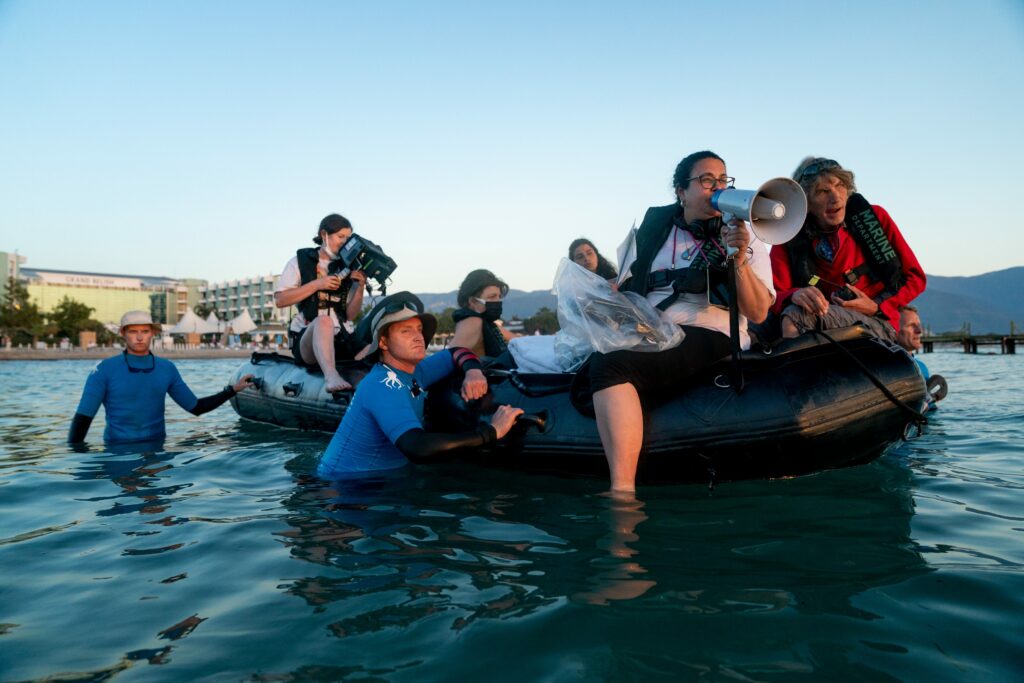It’s 2011 in a suburb beyond the city of Damascus, Syria. Two sisters are playing in an unspoiled pool scene. Individuals of any age sprinkle around them or plunge underneath the’s water surface. The sun is out, there’s popular music behind the scenes. Encircled by mountains and a periodic sprinkling of palm trees, you could have confused this second with some place in California. There’s a difficult feeling of business as usual to this grouping, understanding what will befall Syria in the following couple of years.

This ordinary start of “The Swimmers” before long pushes ahead so as to 2015. The young ladies, Yusra (Nathalie Issa) and Sara (Manal Issa) are more established at this point. The two are conflicted between needing to partake in their childhood notwithstanding demise and annihilation and zeroing in on their swimming vocations. At the point when their nation’s conflict can presently not be disregarded, they choose to overcome the slippery relocation to Europe, as a great many individual outcasts have done. Then, regardless of all chances, Yusra keeps on battling for her fantasy about swimming at the Olympics.

In view of the genuine story of Yusra and Sara Mardini, Sally El Hosaini’s “The Swimmers” is a contacting picture of their battle to get by and accomplish the unimaginable. The content co-composed by El Hosaini and Jack Thorne doesn’t relax the risk or difficulties the sisters looked on their trip to Germany, yet it keeps its focal characters grounded in trust and reality. The two sisters contend, commit errors, and are too severe with themselves, however that is important for what makes their story so convincing. They were customary youngsters tossed into uncommon conditions.

While generally centered around the young ladies’ excursion, “The Swimmers” sporadically enlarges the extent of its close to home individual story to notice the more extensive compassionate emergency confronting transients right up to the present day. The young ladies track down security with individual voyagers yet are misdirected or mishandled by bootleggers, snooze squeezed living quarters overpowered with fresh debuts, and face regulatory formality while attempting to rejoin with their family abandoned in Syria.

With the focal point of cinematographer Christopher Ross, El Hosaini imagines the predicament of outcasts in minutes like when the sisters show up on a Greek island visited by endless evacuees before them, they stroll through a valley of disposed of splendidly hued lifejackets. The camera peers down at the ocean of lifejackets as a touch of how much bigger this emergency has become. In another scene, the sisters crash an ocean side hotel by claiming to dress and carry on like Europeans so they can sneak by clueless staff and guests to clean up. The unaware beachgoers are ignorant regarding the outcast camp simply a short leave. They’re having the sort of radiant day the young ladies once appreciated back home, and Ross repeats the style of that initial arrangement to outline what the sisters have lost in the Syrian Nationwide conflict.

Like their characters Yusra and Sara, Nathalie and Manal Issa are sisters, in actuality, adding profundity to their on-screen dynamic. There’s a common history between the two — a feeling of past trusts, treacheries, and compromises behind their non-verbal communication and tone. Their exchange scenes run from mindful and strong to out and out contentious, denoting an equal close to home excursion close by their actual one.
While the careful bond becomes the dominant focal point, the supporting cast uncovers more about the fundamental characters. Their extreme yet adoring dad and mentor Essat (Ali Suliman) and hovering mother Mervat (Somewhat Alloush) lay out the caring home the young ladies are abandoning and their nonappearance in the sisters’ life out and about is profoundly felt. Their cousin Nizar (Ahmed Malek) joins the two sisters in their movement and through his freshness and active execution reminds the crowd how youthful numerous exiles are — Yusra, the more youthful sister, is only 17 years of age when they leave Syria. Once in Germany after their outrageous difficulty, Yusra’s swim mentor, Sven (Matthias Schweighöfer), supplements her dad’s previous real love examples with another one: figuring out how to excuse herself. He offers a grace that is generally absent from the film after the sisters ventured out from home and he flags the beginning of another section in their lives.

El Hosaini’s retelling of the Mardini sisters’ story is a moving recognition for them, to the large numbers of exiles who gambled with all that to remove themselves to somewhere safe and secure, and an update that a considerable lot of their accounts are as yet progressing. It’s the sort of persuasive games film that is about something beyond the competitor or the major event. “The Swimmers” is about a reason a lot greater than the Olympics and is let on an individual scale know that makes the issue open and remarkable.

Leave a Reply